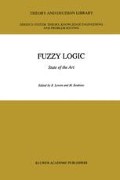Abstract
We are concerned with certain useful special properties which fuzzy relations on a set may possess or lack. They are generalizations of properties of crisp relations, which is to say that the fuzzy definitions coincides with the crisp definition whenever the the relation in question is in fact crisp.
Access this chapter
Tax calculation will be finalised at checkout
Purchases are for personal use only
Preview
Unable to display preview. Download preview PDF.
References
Bandler, W. and Kohout, L.J. Special properties, closures and interiors of crisp and fuzzy relations. Fuzzy Sets and Systems, 26(3): 317–332, June 1988.
Bandler, W. and Kohout, L.J. Fast fuzzy relational algorithms. In Ballester, A., Cardus, D., and Trillas, E., editors, Proc. of the Second Iniernat. Conference on Mathematics at the Service of Man, pages 123–131, (Las Palmas, Canary Islands, Spain, 28 June–3 July), Universidad Politechnica de las Palmas, Las Palmas, 1982.
Bandler, W. and Kohout, L.J. Fuzzy relational products as a tool for analysis and synthesis of the behaviour of complex natural and artificial systems. In Wang, P.P. and Chang, S.K., editors, Fuzzy Sets: Theory and Applications to Policy Analysis and Information Systems, pages 341–367, Plenum press, New York and London, 1980.
Bandler, W. and Kohout, L.J. Semantics of implication operators and fuzzy relational products. Internal Journal of Man-Machine Studies, 12:89–116, 1980. Reprinted in Mamdani, E.H. and Gaines, B.R. eds. Fuzzy Reasoning and its Applications. Academic Press, London, 1981, pages 219-246.
Bandler, W. and Kohout, L.J. The identification of hierarchies in symptoms and patients through computation of fuzzy relational products. In Parslow, R.D., editor, BCS’81: Information Technology for the Eighties (Proc. Conf. The British Computer Society, London, 1-3 July 1981), pages 191–194, Heyden & Son, London, 1981.
Ben-Ahmeida, B., Kohout, L.J., and Bandler, W. The use of fuzzy relational products in comparison and verification of correctness of knowledge structures. In Kohout, L.J., Anderson, J., and Bandler, W., editors, Knowledge-Based Systems for Multiple Environments, chapter 16, Ashgate Publ. (Gower), Aldershot, U.K., 1992.
Bandler, W. and Kohout, L.J. A survey of fuzzy relational products in their applicability to medicine and clinical psychology. In Kohout, L.J. and Bandler, W., editors, Knowledge Representation in Medicine and Clinical Behavioural Science, pages 107–118, an Abacus Book, Gordon and Breach Publ., London and New York, 1986.
Bandler, W. and Mancini, V. Internal representation of built environment. In Bezdek, J., editor, Proceedings of NAFIPS’88 (North American Fuzzy Information Processing Society, 7th Annual meeting, San Francisco, Calif, June 1988), pages 1–6, NAFIPS, 1988.
Mancini, V. and Bandler, W. Congruence of structures in urban knowledge representation. In Bouchon, B., Saita, L, and Yager, R., editors, Uncertainty and Intelligent Systems (Lecture Notes in Computer Science), pages 219–225, Springer-Verlag, Berlin, 1988.
Bandler, W., Mancini, V., and Stiller, E.M. (Guest Editors). The URBS Project: Acquisition, Representation and Manipulation of Knowledge for a Computerized Advisory System on City Problems. In Journal of Intelligent Systems (A special issue), Freund Publishing House Ltd., London, U.K., 1993.
Kohout, L.J. and Kim, Yong-Gi. Use of fuzzy relational information retrieval techniques for generating control strategies in resolution-based automated reasoning. In FLAIRS — 90 Proceedings, pages 140–144, The Florida Artificial Intelligence Research Society, 1990.
Kim, Yong-Gi and Kohout, L.J. Comparison of fuzzy implication operators by means of weighting strategy in resolution-based automated reasoning. In Berghel, G.E. and Hedrick, G.E., editors, Proc. of the 1992 Symposium on Applied Computing (SAC’ 92), ACM, 1992.
Kohout, L.J. and Bandler, W. Fuzzy relational products in knowledge engineering. In International Symposium on Fuzzy Approach to Reasoning and Decision-Making, (Bechyn&#c011B;, Czechoslovakia, June 25-29, 1990)., (Bechyn&#c011B;, Czechoslovakia, June 25-29,1990). In: Selected papers thereof, V. Novák et al. (eds.), North-Holland & Academia, in press.
Kohout, L.J., Anderson, J., Bandler, W., Gao, S., and Trayner, C. CLINAID: A knowledge-based system for support of decisions in the conditions of risk and uncertainty. In Kohout, L.J., Anderson, J., and Bandler, W., editors, Knowledge-Based Systems for Multiple Environments, chapter 10, Ashgate Publ. (Gower), Aldershot, U.K., 1992.
Kohout, L.J., Keravnou, E., and Bandler, W. Automatic documentary information retrieval by means of fuzzy relational products. In Gaines, B.R., Zadeh, L.A., and Zimmermann, H.-J., editors, Fuzzy Sets in Decision Analysis, pages 383–404, North-Holland, Amsterdam, 1984.
Kohout, L.J. and Bandler, W. The use of fuzzy information retrieval techniques in construction of multi-centre knowledge-based systems. In Bouchon, B. and Yager, R.R., editors, Uncertainty in Knowledge-Based Systems (Lecture Notes in Computer Science vol. 286), pages 257–264, Springer Verlag, Berlin, 1987.
Kohout, L.J. and Kallala, M. Evaluator of neurological patients’ dexterity based on relational fuzzy products. In Proc. of Second Expert Systems International Conference (London, October 1986), pages 1–12, Learned Information Inc., New Jersey, USA and Oxford, UK, 1986.
Kohout, L.J. and Bandler, W. Use of fuzzy relations in knowledge representation, acquisition and processing. In Zadeh, L.A. and Kacprzyk, J., editors, Fuzzy Logic for the Management of Uncertainty, page, John Wiley, New York, in press.
Negoita, C.V. and Ralescu, D.A. Applications of fuzzy sets to systems analysis. Wiley, New York, 1975.
Kitainik, L. For closeable and cutworthy properties, closures always commute with cuts. In Proc. of the IEEE Internat. Conference on Fuzzy Systems 1992, pages 703–704, IEEE, New York, 1992.
Author information
Authors and Affiliations
Editor information
Editors and Affiliations
Rights and permissions
Copyright information
© 1993 Springer Science+Business Media Dordrecht
About this chapter
Cite this chapter
Bandler, W., Kohout, L.J. (1993). Cuts Commute with Closures. In: Lowen, R., Roubens, M. (eds) Fuzzy Logic. Theory and Decision Library, vol 12. Springer, Dordrecht. https://doi.org/10.1007/978-94-011-2014-2_16
Download citation
DOI: https://doi.org/10.1007/978-94-011-2014-2_16
Publisher Name: Springer, Dordrecht
Print ISBN: 978-94-010-4890-3
Online ISBN: 978-94-011-2014-2
eBook Packages: Springer Book Archive

